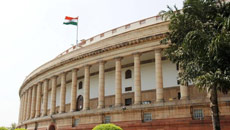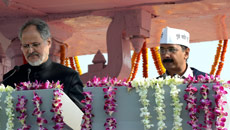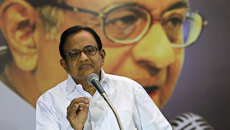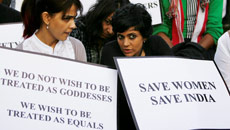The AAP unveiled for the first time Thursday its national vision, saying it favoured a healthy market economy and zero tolerance towards terrorism sponsored by Pakistan.
Releasing the AAP manifesto for the Lok Sabha election, former Delhi chief minister Arvind Kejriwal said India today faced three major threats in the form of corruption, communalism and crony capitalism.
Presenting a business friendly image, Kejriwal said the Aam Aadmi Party, founded in November 2012, would foster healthy competition in the market economy and curb monopolistic and anti-competition practices.
"Job creation shall be the primary objective of the economic policies of the AAP, and to this end we will promote honest businesses and entrepreneurs," Kejriwal said, reading out from the 25-page manifesto.
On foreign direct investment (FDI), the AAP leader said: "We are not against FDI in principle but we opposed it sector wise." But he insisted that his party was against FDI in retail trade.
It is the first time the AAP has come out with its comprehensive thinking on a host of issues after being dubbed as a party with a singular mindset: how to battle corruption.
Kejriwal said the AAP was not limited by ideological orthodoxies in both domestic and international economic issues.
"It is neither Left nor Right and will support every good idea, old or new, if it is in the interest of India," the manifesto said.
On foreign policy, the AAP said -- without taking Pakistan's name -- that it would show no toleration for cross-border terrorism.
It called for coordinated bilateral and multilateral efforts to prosecute terrorists and a sustained dialogue at various levels to dismantle the structures that encourage terrorism.
The AAP advocated enhancing India's capacity to deter border incursions by China.
The AAP, Kejriwal said, would come down heavily on "those practising politics in the name of religion" and called for time bound investigation to identify the masterminds behind riots.
The manifesto said all major natural resources including water and forests would vest with the state and their commercial exploitation would be done based on a royalty and revenue sharing agreement.
The party reiterated its support for a Jan Lokpal bill, saying undeclared assets of public servants would be liable for confiscation.
"Any public official guilty of corruption would be removed from their position and sentenced to prison. Their property will be confiscated."
Kejriwal resigned Feb 14 after being Delhi's chief minister for 49 days when he failed to muster majority support in the assembly to pass the Jan Lokpal bill.
The AAP advocated state funding of elections and strong disclosure norms for political parties besides a supplemental system of proportional representations in elections.
"Political parties will have to put up all details of their donors on their web site even if the donation amounts to one rupee. All expenses of political leaders during elections will have to be declared as well."
It also called for simplification of rules and regulations and ensuring effective administration of law.
The AAP pledged to bring back black money stashed abroad, and curtail the widespread use of black money in real estate and property dealings.
Kejriwal said decentralization was a must to develop the rural economy. Accordingly, the manifesto called for increased powers to Gram Sabhas, as well as a concerted push in traditional industries.





